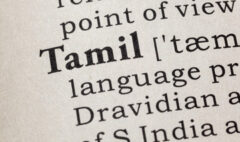How to Use Tamil to Express Your Opinion
How to Use Tamil to Express Your Opinion
More Than Just the Facts: A Guide on How to Express Your Opinion in Tamil
As you advance in your Tamil language journey, you will naturally want to move beyond stating simple facts and start sharing a part of yourself: your thoughts, your beliefs, and your opinions. The ability to express what you think and how you feel about a topic is the cornerstone of a truly meaningful conversation. It is the skill that transforms you from a passive language user into an active and engaged participant in a dialogue. The world of conversational Tamil is rich with phrases and structures for expressing opinions in Tamil, whether you are having a casual chat about a new movie or a more serious discussion about a current event. Knowing these phrases will not only allow you to share your own perspective but will also help you to understand and engage with the opinions of others. This guide is designed to be your toolkit for articulate expression. We will explore a variety of Tamil phrases for debate and discussion, giving you the confidence to start talking about your opinions in a way that is clear, respectful, and culturally nuanced.
The Foundational Phrases: “In My Opinion…”
The first step is to learn the basic phrases that signal to your listener that you are about to state a personal viewpoint. These are the equivalent of “I think…” or “In my opinion…” in English.
1. The Most Common Phrase: “Enna poruthavarai…” (என்னைப் பொறுத்தவரை…)
- Literal Translation: “As far as I am concerned…”
- Usage: This is a very common and versatile phrase that can be used in both formal and informal contexts. It’s a polite and clear way to introduce your personal take on a matter.
- Example: “என்னைப் பொறுத்தவரை, இந்தத் திரைப்படம் மிகவும் நன்றாக இருந்தது.” (Ennai-p poruthavarai, indha-th thiraippadam migavum nandraaga irundhadhu.) – “As far as I’m concerned, this movie was very good.”
2. The Simple and Direct Phrase: “Enakku thonudhu…” (எனக்குத் தோணுது…)
- Literal Translation: “It seems to me…” or “I feel that…”
- Usage: This is a more informal and conversational way to express your opinion. It’s perfect for casual chats with friends and family. It implies a thought or a feeling rather than a deeply held conviction. The formal version is “எனக்குத் தோன்றுகிறது” (Enakku-th thondrugiradhu).
- Example: “இன்று மழை வரும்னு எனக்குத் தோணுது.” (Indru mazhai varum-nu enakku-th thonudhu.) – “I have a feeling it will rain today.” (The “-nu” is a spoken Tamil contraction of “endru,” meaning “that”).
3. The Formal and Assertive Phrase: “En karuthu ennavendral…” (என் கருத்து என்னவென்றால்…)
- Literal Translation: “What my opinion is, is that…”
- Usage: This is a more formal and structured phrase, often used in a debate, a formal discussion, or in writing. It signals that you are about to state a well-considered opinion. The shortened version “என் கருத்துப்படி…” (En karuthuppadi…) means “According to my opinion…”.
- Example: “என் கருத்துப்படி, நாம் இந்தத் திட்டத்தை ஏற்றுக்கொள்ள வேண்டும்.” (En karuthuppadi, naam indha-th thittathai yetrukkolla vendum.) – “According to my opinion, we should accept this plan.”
Agreeing and Disagreeing: The Language of Debate
A conversation is a two-way street. Knowing how to agree and disagree politely is essential for any healthy discussion.
Phrases for Agreeing:
- “You are right.”: “நீங்கள் சொல்வது சரிதான்.” (Neengal solvadhu saridhaan.)
- “I agree.”: “நான் ஒப்புக்கொள்கிறேன்.” (Naan oppukkolgiren.) – This is quite formal.
- “That’s correct.”: “அது கரெக்ட்தான்.” (Adhu correct-dhaan.) – Using the English word “correct” is extremely common.
- “Exactly! / Absolutely!”: “கண்டிப்பாக!” (Kandippaaga!) or “நிச்சயமாக!” (Nichayamaaga!). These are strong words of affirmation.
- “I think so too.”: “நானும் அப்படித்தான் நினைக்கிறேன்.” (Naanum appadi-thaan ninaikkiren.)
Phrases for Disagreeing Politely:
In Tamil culture, direct and blunt disagreement can sometimes be seen as confrontational. It is often more polite to soften your disagreement.
- “I’m sorry, but I don’t agree.”: “மன்னிக்கவும், நான் இதை ஒப்புக்கொள்ளவில்லை.” (Mannikkavum, naan idhai oppukkolla villai.)
- “That may be true, but…”: “அது உண்மையாக இருக்கலாம், ஆனால்…” (Adhu unmaiyaaga irukkalaam, aanaal…) – This is an excellent way to acknowledge their point before introducing your own.
- “I see it a little differently.”: “நான் இதை வேறு விதமாகப் பார்க்கிறேன்.” (Naan idhai veru vidhamaaga-p paarkiren.)
- A gentle “No…”: Instead of a blunt “இல்லை” (illai), you can soften it by saying “இல்லையே…” (illaiye…), which sounds less confrontational and more like “Well, not really…”.
Expressing Likes, Dislikes, and Preferences
A large part of sharing your opinion is talking about what you like and dislike.
- “I like…”: “எனக்கு … பிடிக்கும்.” (Enakku … pidikkum.)
- Example: “எனக்கு காபி பிடிக்கும்.” (Enakku coffee pidikkum.) – “I like coffee.”
- “I don’t like…”: “எனக்கு … பிடிக்காது.” (Enakku … pidikkaadhu.)
- Example: “எனக்கு அந்தப் பாட்டு பிடிக்காது.” (Enakku andha-p paattu pidikkaadhu.) – “I don’t like that song.”
- “I prefer this over that.”: “அதைவிட இது எனக்குப் பிடித்திருக்கிறது.” (Adhai-vida idhu enakku-p pidithirukkiradhu.) – “More than that, I like this.”
- “I love… / My favorite is…”: “எனக்கு … மிகவும் பிடிக்கும்.” (Enakku … migavum pidikkum.) – “I like … very much.”
Structuring Your Argument: Supporting Your Opinion
Once you’ve stated your opinion, you need to support it. Here are some phrases to help you structure your argument.
- “For example…”: “உதாரணமாக…” (Udhaaranamaaga…).
- “Firstly… Secondly…”: “முதலில்… இரண்டாவதாக…” (Mudhalil… irandaavadhaaga…).
- “Not only that, but also…”: “அது மட்டுமல்லாமல்…” (Adhu mattumallaamal…).
- “The main reason is…”: “அதற்கு முக்கிய காரணம் என்னவென்றால்…” (Adharku mukkiya kaaranam ennavendraal…).
- “Therefore… / So…”: “அதனால்…” (Adhanaal…).
- “In conclusion…”: “முடிவாக…” (Mudivaaga…).
Putting It All Together: A Sample Conversation
Scenario: Two friends are discussing a new movie.
Anitha: “நேற்று அந்தப் புதிய படம் பார்த்தியா?” (Netru andha-p pudhiya padam paarthiyaa?) – “Did you see that new movie yesterday?”
Bala: “ஆமா, பார்த்தேன். எனக்கு ரொம்பப் பிடிச்சிருந்தது.” (Aama, paarthen. Enakku romba-p pidichirundhadhu.) – “Yes, I saw it. I really liked it.”
Anitha: “அப்படியா! எனக்குத் தோணுது, கதை கொஞ்சம் மெதுவாகப் போன மாதிரி இருந்தது.” (Appadiyaa! Enakku-th thonudhu, kadhai konjam medhuvaaga-p pona maadhiri irundhadhu.) – “Really! I felt that the story was a bit slow.”
Bala: “அது உண்மையாக இருக்கலாம், ஆனால் என்னைப் பொறுத்தவரை, நடிகர்களின் நடிப்பு அருமையாக இருந்தது.” (Adhu unmaiyaaga irukkalaam, aanaal ennai-p poruthavarai, nadigargalin nadippu arumaiyaaga irundhadhu.) – “That may be true, but in my opinion, the actors’ performances were excellent.”
Anitha: “நீங்கள் சொல்வது சரிதான். குறிப்பாக, கதாநாயகியின் நடிப்பு சூப்பரா இருந்தது.” (Neengal solvadhu saridhaan. Kurippaaga, kadhanaayagiyin nadippu super-a irundhadhu.) – “You are right. Especially, the heroine’s acting was superb.”
Bala: “கண்டிப்பாக! அதனால்தான், என் கருத்துப்படி, அந்தப் படம் ஒரு வெற்றி.” (Kandippaaga! Adhanaal-thaan, en karuthuppadi, andha-p padam oru vetri.) – “Absolutely! That’s why, according to my opinion, that film is a success.”
Conclusion: The Voice of Your Thoughts
Learning how to express your opinion is a liberating step in your Tamil language journey. It is the moment you transition from being a passive recipient of the language to an active creator of meaning. Start with the foundational phrases like “Enakku thonudhu” and “Enna poruthavarai.” Practice the simple art of stating what you like and dislike. As you grow more confident, you can begin to engage in more complex discussions, using the language of agreement and disagreement. Don’t be afraid that your opinion might be “wrong.” The goal of a good conversation is not always to agree, but to understand and be understood. By learning to voice your own unique perspective, you are not just practicing grammar and vocabulary; you are building the bridge that allows your thoughts and your personality to shine through in a new and beautiful language.












